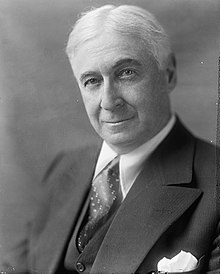Our website is made possible by displaying online advertisements to our visitors.
Please consider supporting us by disabling your ad blocker.
Bernard Baruch
Bernard Baruch | |
|---|---|
 | |
| Born | Bernard Mannes Baruch August 19, 1870 Camden, South Carolina, U.S. |
| Died | June 20, 1965 (aged 94) New York City, U.S. |
| Alma mater | City College of New York (BA) |
| Occupations |
|
| Spouse | Annie Griffin |
| Children | 3, including Belle W. |
| Father | Simon Baruch |
| Honors | Bernard Baruch Handicap at Saratoga Race Course |
| Signature | |
Bernard Mannes Baruch[nb 1] (August 19, 1870 – June 20, 1965) was an American financier and statesman.
After amassing a fortune on the New York Stock Exchange, he impressed President Woodrow Wilson by managing the nation's economic mobilization in World War I as chairman of the War Industries Board. He advised Wilson during the Paris Peace Conference. He made another fortune in the postwar bull market, but foresaw the Wall Street crash and sold out well in advance.
In World War II, he became a close advisor to President Franklin D. Roosevelt on the role of industry in war supply, and he was credited with greatly shortening the production time for tanks and aircraft. Later he helped to develop rehabilitation programs for injured servicemen. In 1946, he was the United States representative to the United Nations Atomic Energy Commission, though his Baruch Plan for international control of atomic energy was rejected by the Soviet Union.
- ^ William Cabell Greet. World Words, Recommended Pronunciations. Columbia University Press, 1948. p. 44.
- ^ Correspondence of December 11, 1936, reprinted in Robert Keith Leavitt. Noah's Ark, New England Yankees, and the Endless Quest: A Short History of the Original Webster Dictionaries, with Particular Reference to Their First Hundred Years as Publications of G. & C. Merriam Company. Merriam, 1947. p. 102.
Cite error: There are <ref group=nb> tags on this page, but the references will not show without a {{reflist|group=nb}} template (see the help page).
Previous Page Next Page


